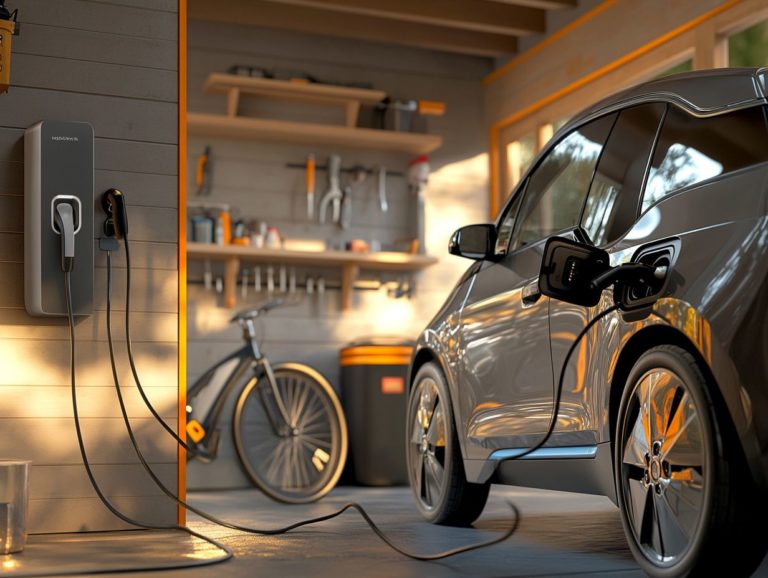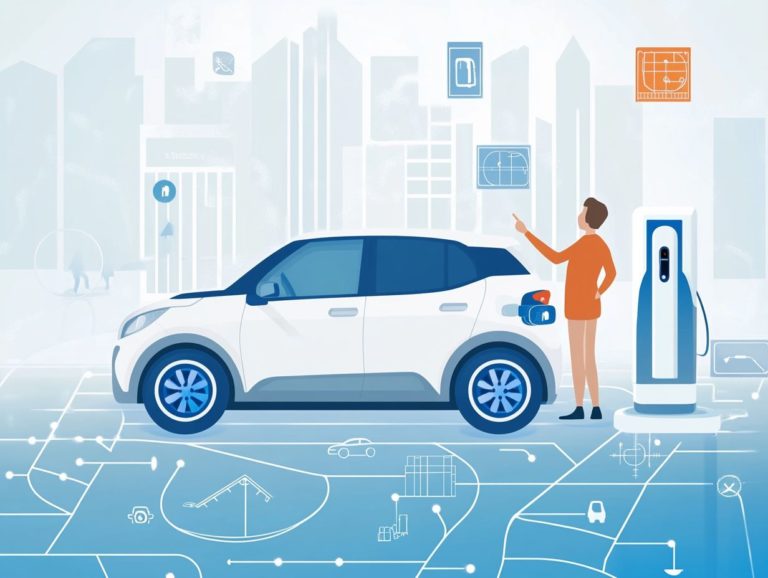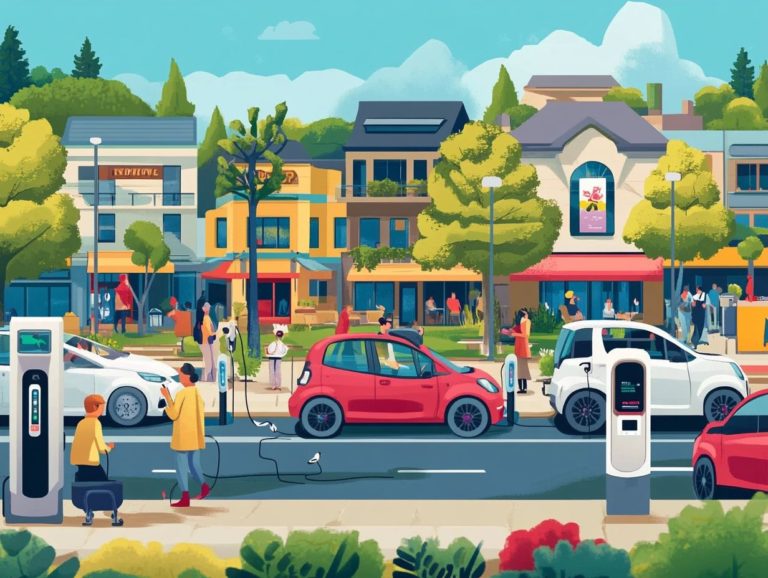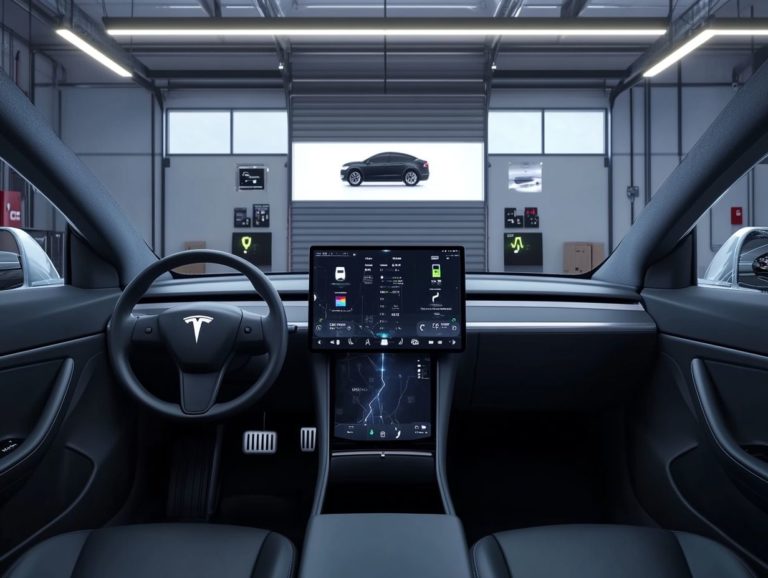Do Electric Cars Make Noise?
Electric cars are revolutionizing your perspective on transportation, presenting a quieter and often more efficient alternative to traditional gasoline vehicles.
As their popularity continues to rise, you may find yourself asking questions about how they operate and their overall impact particularly regarding noise levels. This article delves into the history and development of electric cars, explaining how they function and outlining the current noise regulations in place.
You ll discover how their noise levels compare to gasoline cars, explore pedestrian safety concerns, and uncover innovative solutions aimed at addressing noise-related issues.
Join us as we explore the fascinating world of electric vehicles and the unique soundscape they generate.
Contents
Key Takeaways:
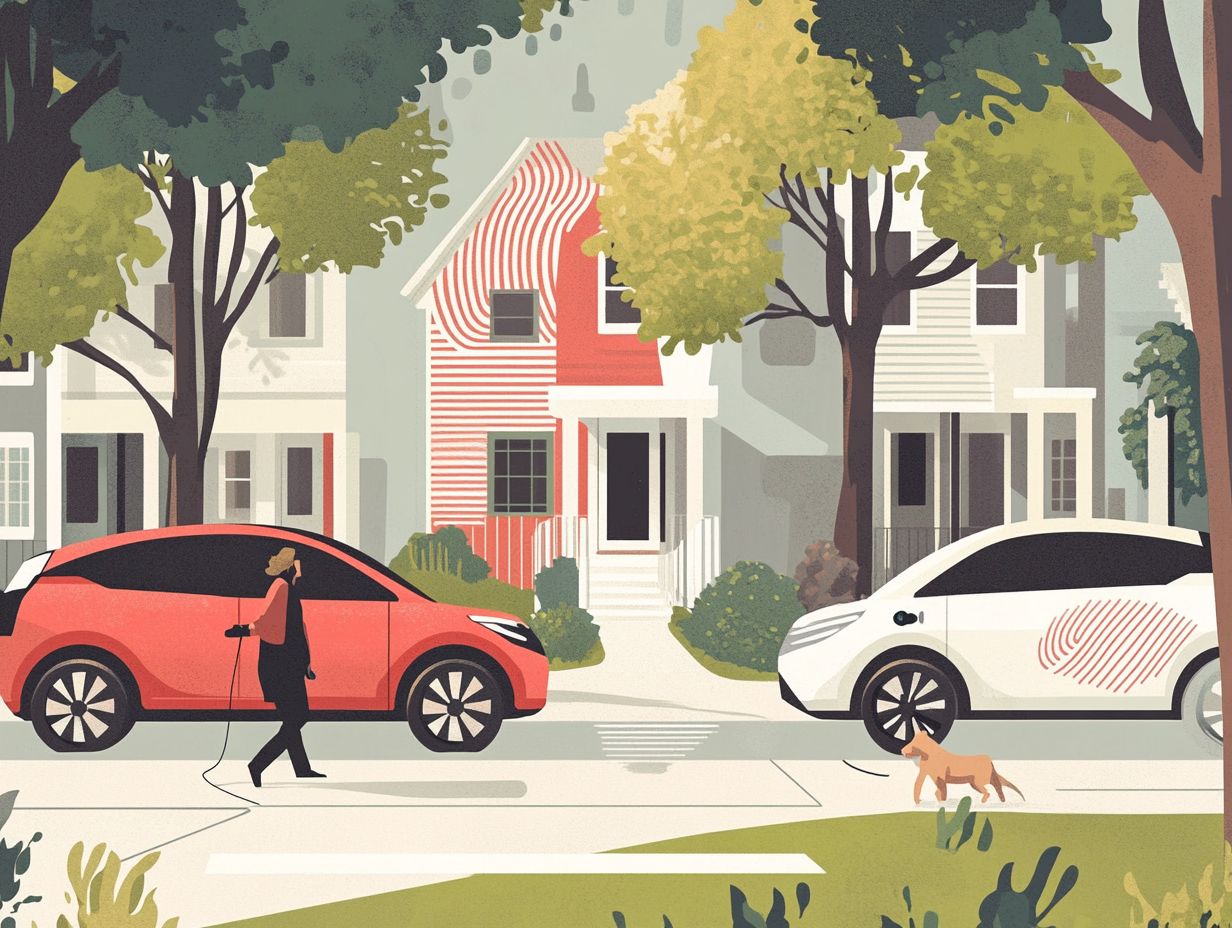
- Electric cars are significantly quieter than traditional gasoline cars due to their use of electric motors and batteries, making them a potential safety concern for pedestrians.
- The lack of noise in electric cars has led to regulations ensuring they make some sound when running, with ongoing efforts to improve these regulations in the future.
- Manufacturers are exploring various solutions, such as adding external speakers or artificial engine sounds, to address noise concerns and enhance pedestrian safety without compromising the benefits of electric cars.
Background on Electric Cars
The amazing journey of electric cars has dramatically reshaped the automotive landscape, propelled by advanced sound design and seamless technology integration that enhances your experience while addressing critical environmental safety concerns.
As leading electric vehicle manufacturers like Hyundai Motor, Toyota, Ford, and BMW push the boundaries of innovation, they navigate the delicate balance between performance and noise pollution.
Manufacturers aim for an exciting sound experience that meets safety rules and thrills speed enthusiasts.
History and Development
The history and development of electric cars trace back to the 19th century, but it’s the recent resurgence, driven by innovations like the Hyundai IONIQ and insights from experts such as Dr. Oliver Jung, that have redefined their modern identity.
You ll notice how these vehicles have undergone a remarkable transformation over the decades. Consider the pivotal moment in 2008 when the Tesla Roadster burst onto the scene, reshaping perceptions of electric mobility.
As the industry shifts towards sustainable practices, there’s a renewed focus not only on performance but also on enhancing the consumer experience. One crucial yet often overlooked aspect of this evolution lies in the integration of how sound affects the driving experience into vehicle design. The subtle hum of electric engines not only enhances user satisfaction but also serves as vital safety alerts.
As electric cars continue to gain popularity fast, the incorporation of sound will undoubtedly play a pivotal role in shaping your driving experience.
How Electric Cars Work
Electric cars function by transforming electrical energy into mechanical energy through electric motors, which are energized by advanced batteries. This innovative approach delivers a remarkable driving experience that highlights both the joy of driving and the seamless integration of technology.
Overview of Electric Motors and Batteries
Electric motors and batteries are essential for electric vehicles, shaping not only their efficiency and performance but also influencing driving modes and sound systems that elevate your entire driving experience.
When these components work in harmony, they unlock a range of driving modes tailored to your preferences whether you’re opting for eco-friendly settings to extend battery life or selecting sport modes for an adrenaline-fueled adventure. This versatility caters to your unique driving needs while enhancing the vehicle s behavior on the road.
Meanwhile, sound systems provide vital auditory feedback, deepening your connection to the vehicle s performance.
This interactive audio landscape can signal shifts in power delivery or amplify the sensation of acceleration, crafting a more compelling driving experience that resonates with the vehicle’s dynamic capabilities.
Noise Regulations for Electric Cars
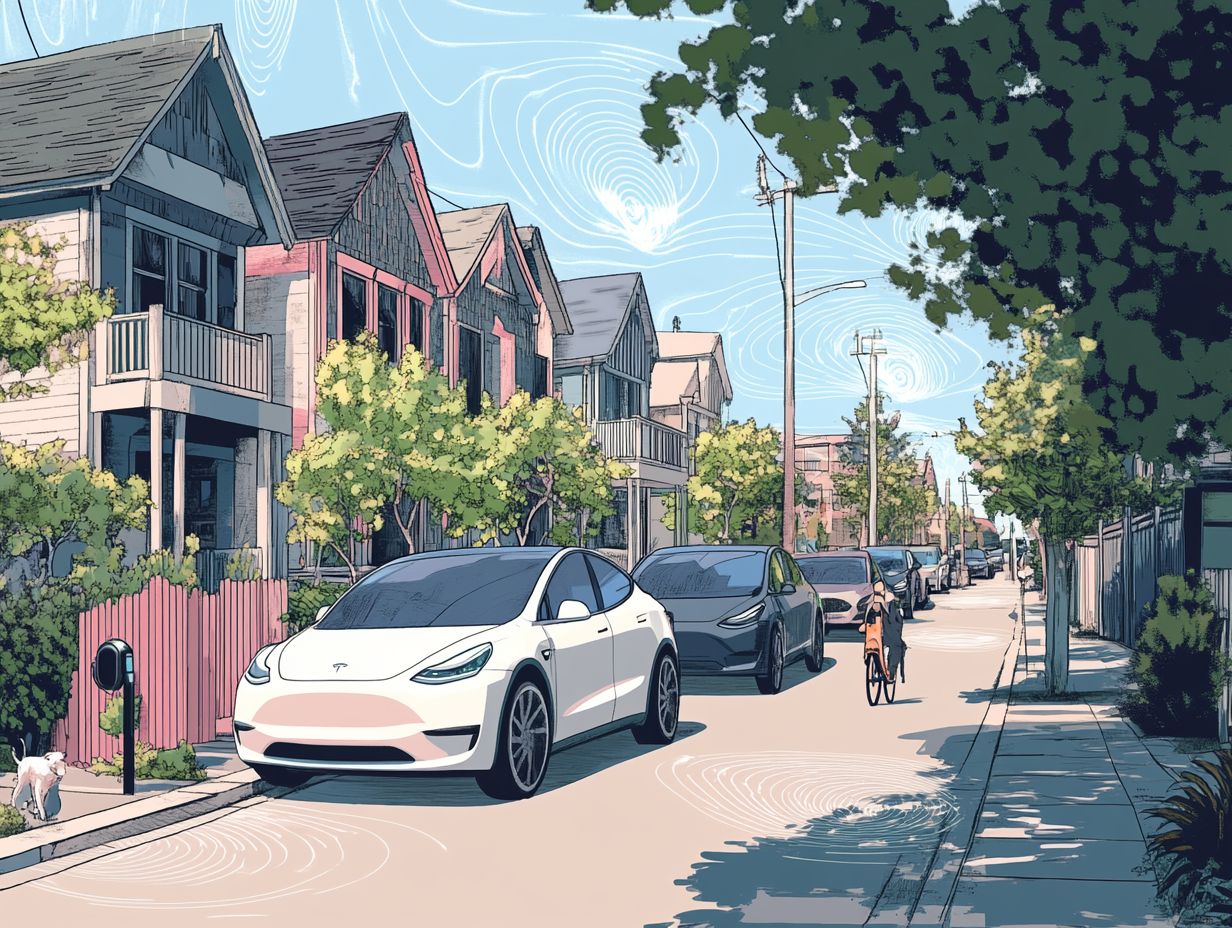
Noise regulations for electric cars have gained significant importance as the automotive industry transitions to quieter vehicles. It’s essential for you to adhere to safety regulations while addressing environmental safety and noise pollution concerns effectively.
Balancing these factors is crucial in promoting a balance of innovation and public well-being.
Current Regulations and Future Changes
Current regulations regarding electric vehicles demand that you, as a manufacturer, adhere to specific safety standards. Upcoming changes will refine these guidelines, promising a more immersive sound experience for both drivers and pedestrians.
As the electric vehicle market expands, expect these regulations to evolve beyond mere safety measures. They will embrace innovations in sound design, presenting a unique opportunity for you to incorporate customizable sound profiles that emulate traditional engine noises or craft distinctive soundscapes.
By investing in advanced acoustic technologies, you can ensure compliance and elevate the overall sound experience. This will strike a balance between safety and enjoyment. These adaptations could lead to a thrilling new trend where personalized audio features become a defining characteristic of electric vehicle design.
Noise Levels of Electric Cars
The noise levels of electric cars are markedly lower than those of traditional gasoline vehicles. This reflects sophisticated sound dynamics designed to enhance a quieter driving experience while providing necessary audio cues that contribute to safety and awareness on the road.
Comparing to Traditional Gasoline Cars
When you compare electric cars to traditional gasoline vehicles, it becomes clear that the sound options and auditory feedback offered by electric vehicles create a more immersive journey for both you and your passengers.
Unlike their gasoline counterparts, which typically produce a familiar engine roar, electric vehicles provide a unique auditory experience. This experience can be finely tuned to enhance your driving pleasure.
The absence of engine noise opens the door to subtle soundscapes think soothing ambient tones or customizable sounds that mimic the beauty of nature. This thoughtful design fosters a serene atmosphere within the cabin, effectively reducing noise pollution in urban settings.
Such innovations not only elevate your enjoyment but also demonstrate a commitment to a quieter, more sustainable world, perfectly aligning with the values of the modern driver.
Impact of Noise on Pedestrian Safety
The influence of noise from electric cars on pedestrian safety has emerged as a vital consideration in automotive sound design. Numerous studies underscore the necessity for effective warning sounds to alert pedestrians to the presence of approaching vehicles.
This development is not merely a technical requirement; it represents a commitment to enhancing safety in our increasingly silent streets.
Studies and Statistics
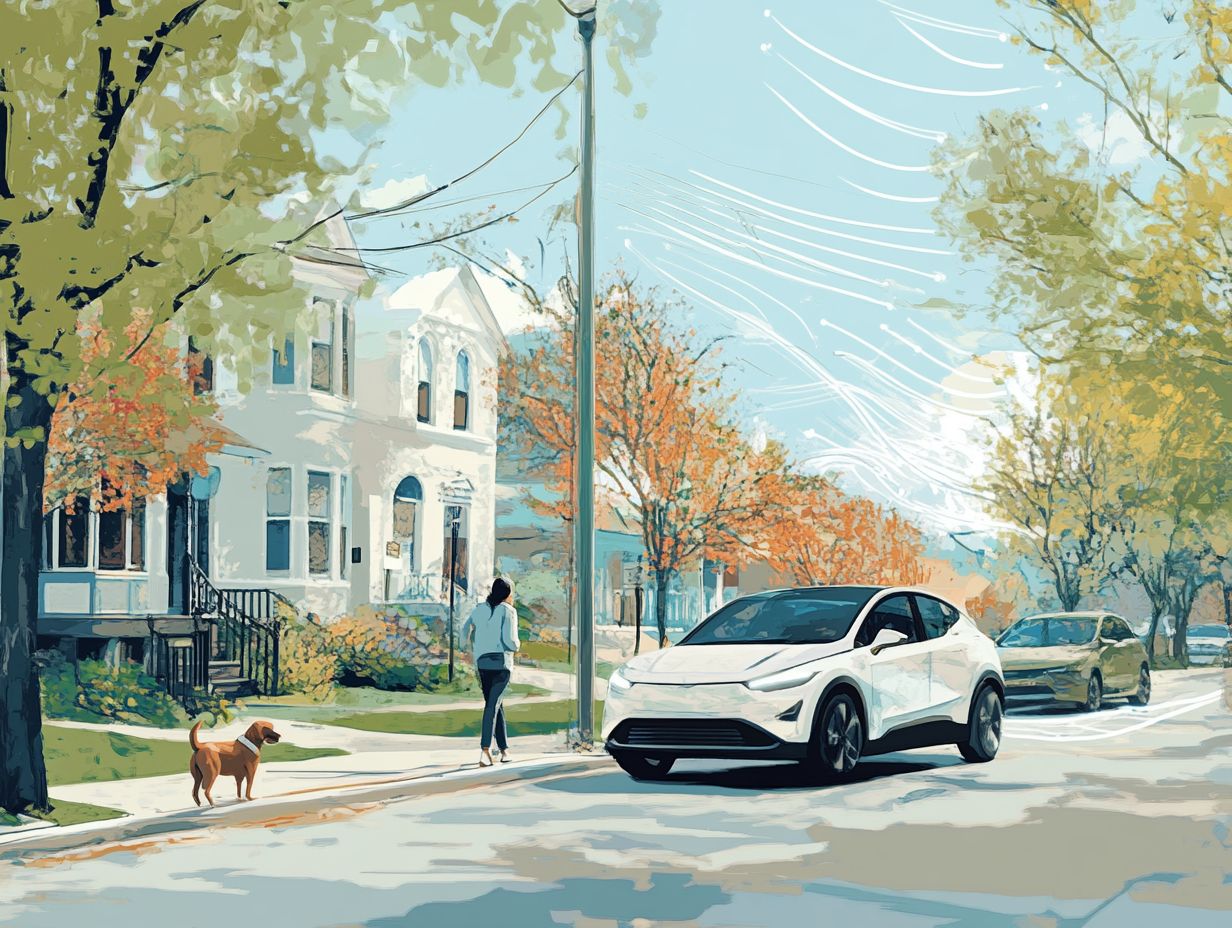
Numerous studies have illuminated the impact of electric vehicle noise levels on pedestrian safety, highlighting the critical need for effective sound solutions in vehicle design.
Researchers have explored how different decibel levels measure sound intensity and can either alert or confuse pedestrians. This significantly affects their ability to detect approaching vehicles.
For example, certain studies reveal that quieter electric vehicles emit alarmingly low sound levels, making it increasingly difficult for vulnerable road users to assess their proximity.
These findings have prompted industry regulators to reassess current standards, paving the way for the adoption of artificial sound production techniques. This approach aims to enhance awareness without sacrificing the tranquil experience that electric vehicles strive to offer.
As this landscape continues to evolve, the balance between innovation and safety becomes paramount. This ultimately shapes future guidelines within the automotive sector.
Efforts to Address Noise Concerns
Efforts to address noise in electric cars are driving exciting innovations. These include customizable sound options that enhance the experience for both users and pedestrians.
Noise-Generating Solutions and Innovations
Innovative noise-generating solutions and advanced sound systems are on the rise. They offer a rich driving experience that fosters a deeper emotional connection between electric vehicles and their drivers through thoughtful sound design.
These cutting-edge innovations often feature customizable soundscapes. You can select audio themes that resonate with your mood whether it’s soothing nature sounds or captivating futuristic tones. This enhances your overall driving ambiance. Some systems even utilize smart technology to adapt sounds in real-time based on driving conditions. This creates a dynamically auditory environment tailored just for you. It makes driving more engaging, turning your everyday commute into a delightful journey!
By cultivating such unique auditory experiences, the automotive industry is redefining how you relate to your electric vehicle. Each trip becomes memorable, deepening your appreciation for the ride.
Frequently Asked Questions
Do electric cars make noise?
No, electric cars do not make noise when they are running. They run quietly, which is a significant advantage over traditional gasoline cars!
Why don’t electric cars make noise?
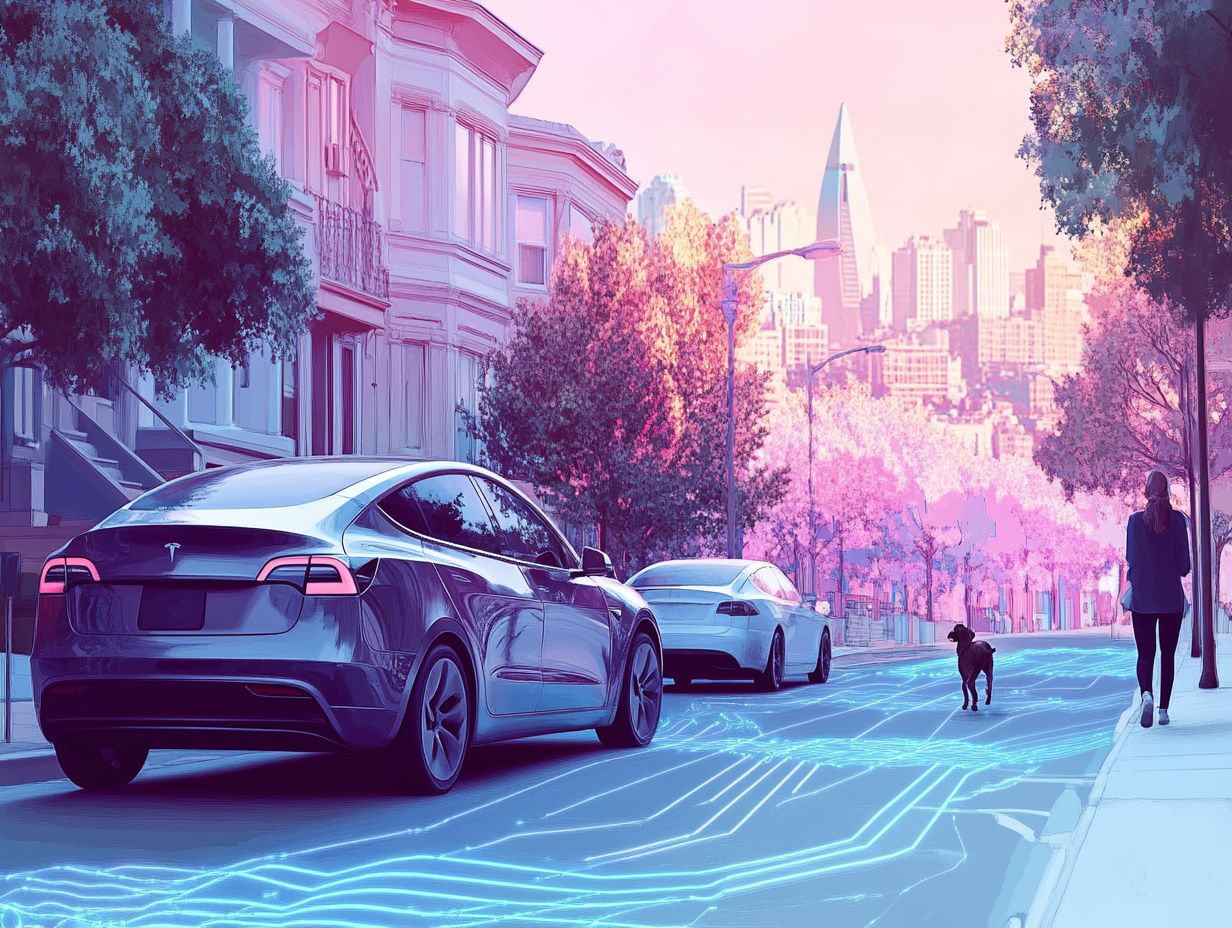
Electric cars use electric motors instead of engines. They lack a muffler or exhaust system, contributing to their quiet nature.
Are there any exceptions to electric cars being silent?
Yes, some electric cars are equipped with speakers that emit artificial engine noise for safety reasons. This alerts pedestrians and other drivers of the car’s presence, especially at low speeds where the car may be harder to hear.
Do all electric cars have the same level of noise?
No, the level of noise can vary between different models and brands of electric cars. Some may have more noticeable road noise or wind noise than others, but overall they are much quieter than traditional cars.
Is there any benefit to electric cars being silent?
Yes, the lack of noise pollution from electric cars is beneficial for both the environment and our health. It also adds to a more peaceful driving experience and reduces noise complaints in densely populated areas.
Are there any downsides to electric cars being silent?
One downside is that pedestrians, especially those who are visually impaired, may not hear an electric car approaching. This is why some countries have regulations requiring electric cars to emit artificial noise at low speeds for safety reasons.
Be thoughtful about the sound experiences in your electric vehicle today! Consider exploring the latest models or taking a test drive to experience these innovations firsthand.


